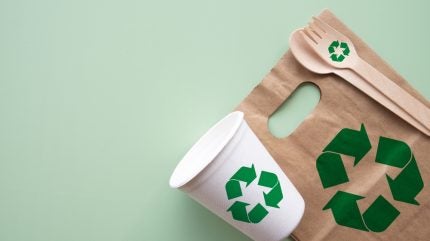
The UK Government has laid draft amendments to the packaging extended producer responsibility (pEPR) regulations before Parliament, proposing technical and operational changes intended to refine how the scheme works from January 2026.
The move follows the first year of pEPR operations, during which issues were identified around material classifications, corporate restructuring and the administration of producer obligations.

Discover B2B Marketing That Performs
Combine business intelligence and editorial excellence to reach engaged professionals across 36 leading media platforms.
Changes to material definitions and modulated fees
A key update clarifies the definition of “fibre-based composite material” in line with PackUK’s recyclability assessment methodology (RAM).
Under the change, packaging made from paperboard or paper fibres with one or more inseparable plastic layers would be classified as composite; however, if the plastic accounts for less than 5% of the total weight, the item would be reported in the paper/board category rather than as a composite material.
The amendments also expand PackUK’s authority to set criteria for modulated fees so that costs better reflect whether packaging is “reasonably necessary” for its purpose.
Closed loop recycling may reduce producer liabilities
For the first time, producers operating closed loop collection and recycling for food-grade plastic household packaging would be able to offset the tonnage they collect and recycle against their EPR fees.

US Tariffs are shifting - will you react or anticipate?
Don’t let policy changes catch you off guard. Stay proactive with real-time data and expert analysis.
By GlobalDataTo qualify, businesses would need to collect the material directly, keep it separate from other producers’ waste, and hold evidence that it has been reprocessed back into food-grade plastic.
The Welsh Government’s accompanying statement confirms this policy intent, describing the measure as a way to recognise circular systems already funding the reprocessing of difficult-to-recycle materials.
Governance: pathway to appoint a producer responsibility organisation
The draft legislation enables PackUK to appoint one or more Producer Responsibility Organisations (PROs) to perform certain functions or provide operational advice on pEPR.
According to industry updates, applications for PRO status are open, with suitability to be assessed on industry support, value for money and past performance.
Earlier this year, Valpak, the Packaging Scheme Forum, and a joint bid from INCPEN and the Food and Drink Federation progressed to the next round of the appointment process. Any appointment will require the consent of the four UK nations.
Timeline and context for producers
If approved, the amendments are expected to take effect from January 2026.
The step fits within PackUK’s RAM roadmap to 2030, which sets out expected timings for policy alignment reviews, RAM updates and key pEPR milestones.
Producers received their first pEPR base-fee invoices in October 2025 and are preparing for wider fee modulation linked to recyclability from 2026.
Clearer guidance is also being put forward for corporate mergers, with the merged entity treated as a large producer if either predecessor met that threshold.
Background: pEPR took effect in January 2025 to shift the full net cost of managing household packaging waste from taxpayers to obligated producers.
PackUK, the scheme administrator, sets household packaging fees, invoices producers and distributes funding to local authorities.
Today’s draft amendments are aimed at tightening definitions, improving fee signals and recognising established closed loop systems, while advancing the process to appoint a PRO to help run the scheme.
For the draft instrument and supporting guidance, see the official legislation listing and government resources.





